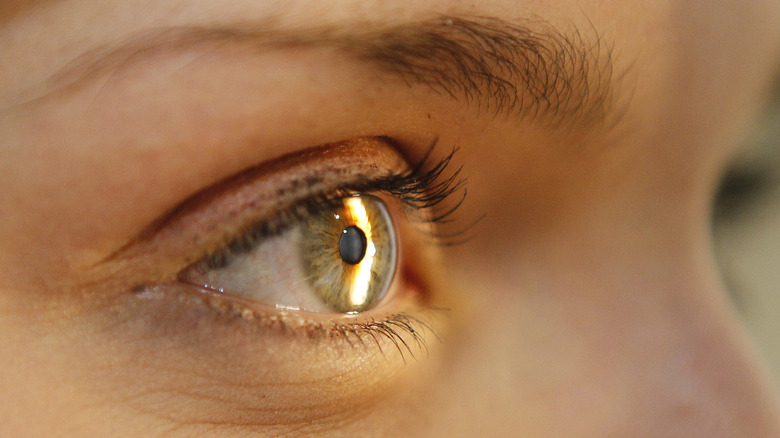Is It Really Possible To Smell Fear?
Historically, people assumed that humans relied mostly on language and sight to communicate with one another, according to NBC News. And with good reason: You might fall in love with someone because you were "speaking the same language." Or maybe it was "love at first sight." And if you saw smoke pooling out from under a door, your first reaction would probably be to yell, "Fire!"
Yet other animals rely much more on olfactory and auditory cues rather than visionary and verbal ones. Dogs go nuts barking when a stranger approaches from up to 12 miles away, and their ears may perk up when a potential threat is even farther away, according to the University of Adelaide. Bloodhounds have the best sense of smell and can even track a scent for upwards of 130 miles. Of course, dogs have more sensory receptors in the nose and can perk up their ears towards sounds to greatly improve their hearing, but it makes one wonder — as fellow mammals, why would humans be any different?
Making them sweat it
In 2012, Dutch researchers set out to determine if humans, like dogs and other animals, could smell fear by collecting sweat from men's armpits who had just watched the horror movie, Stanley Kubrick's "The Shining," and sweat from men who had just watched the slapstick, cringy film, "Jackass" (via Psychological Science). Then, they asked a group of women to smell both types of sweat and measured their eye movements in a visual test. (Women had to do the smelling because they have been shown to have a finer sense of smell linked to more brain cells, according to Medical News Today). The women had much more eye movements — think eyes opened wide in fear — when they smelled the scary movie scents, whereas they tended to scrunch their faces in disgust when they smelled the "Jackass" film scents (via Psychological Science).
Similarly, in a 2008 experiment, researchers took sweat from underneath the armpits of a test group of heterosexual males that was made to watch pornographic videos and another sample from them after they were no longer aroused, according to LiveScience. Then, they asked a group of heterosexual women to smell both samples while researchers measured changes in their brains. What they found was that the aroused sweat activated areas in the brain that recognize emotions and are involved in perception, whereas the control sweat did not (via the Journal of Neuroscience).
The power of pheromones
Other similar studies, including one involving the sweat of students anxious to take an exam and one involving skydiving, have demonstrated similar things. Together a building pile of evidence shows that humans can communicate to some degree through the use of smell, per The Guardian and Mental Floss. Animals naturally produce pheromones, a chemical that is dispelled to alert their fellow species of threats, attract mates, or establish a bond between mother and offspring (via Medical News Today). Maybe we, too, select partners based on their smell. Imagine living your whole life with someone who you couldn't stand if they forgot to put on deodorant.
However, the studies are not conclusive, and whether human beings use pheromones like other species has been debated back and forth for years. According to Mental Floss, the vomeronasal organ present in other animals using pheromones to communicate exists in humans but is thought to not be connected to the nervous system and therefore may not function in the same way, if at all.


